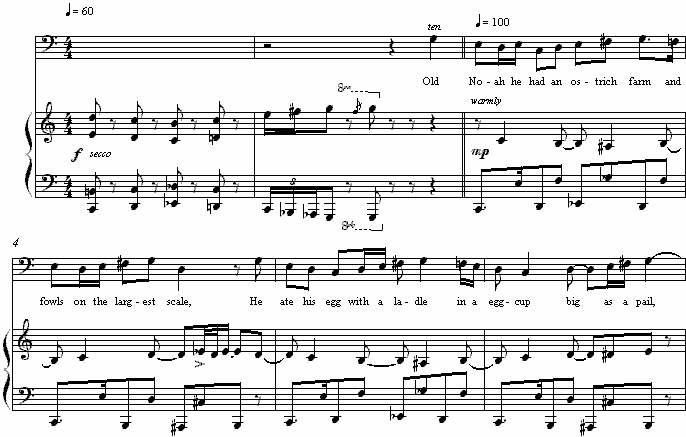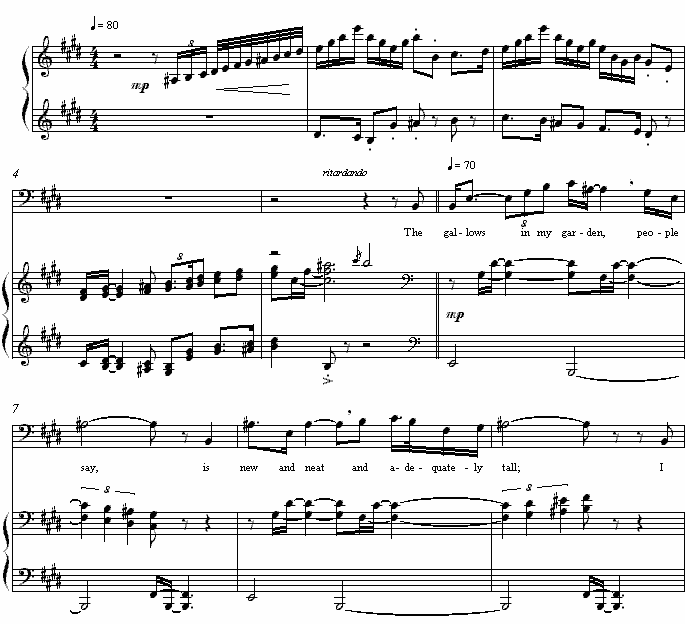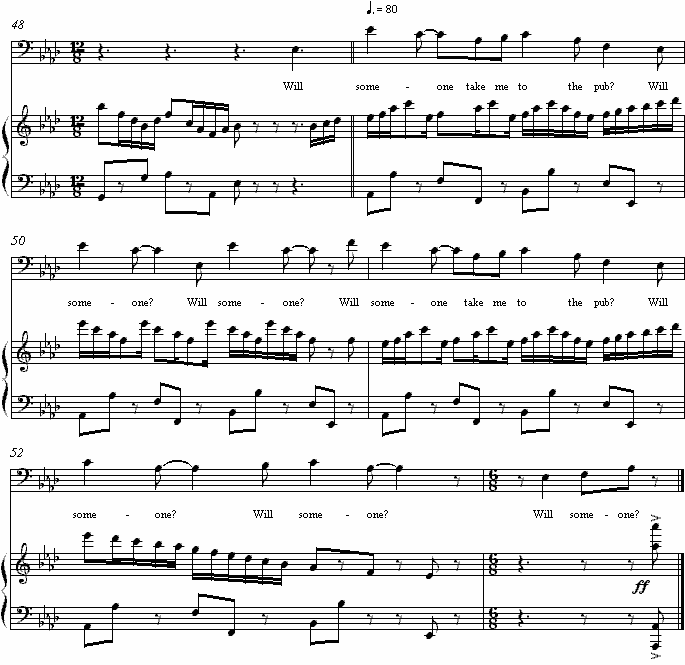Music and Texts of GARY BACHLUND Vocal Music | Piano | Organ | Chamber Music | Orchestral | Articles and Commentary | Poems and Stories | Miscellany | FAQs |
Drolleries and Wisdom - (2005)
G. K. Chesterton
Six songs for baritone and piano
i. Wine and Water - from The Flying Inn (1914) [ 6 pages, circa 3' 10" ]
Old Noah he had an ostrich farm and fowls on the largest scale,
He ate his egg with a ladle in a egg-cup big as a pail,
And the soup he took was Elephant Soup and fish he took was Whale,
But they all were small to the cellar he took when he set out to sail,
And Noah he often said to his wife when he sat down to dine,
"I don't care where the water goes if it doesn't get into the wine."
The cataract of the cliff of heaven fell blinding off the brink
As if it would wash the stars away as suds go down a sink,
The seven heavens came roaring down for the throats of hell to drink,
And Noah he cocked his eye and said, "It looks like rain, I think,
The water has drowned the Matterhorn as deep as a Mendip mine,
But I don't care where the water goes if it doesn't get into the wine."
But Noah he sinned, and we have sinned; on tipsy feet we trod,
Till a great big black teetotaller was sent to us for a rod,
And you can't get wine at a P. S. A., or chapel, or Eisteddfod,
For the Curse of Water has come again because of the wrath of God,
And water is on the Bishop's board and the Higher Thinker's shrine,
But I don't care where the water goes if it doesn't get into the wine.ii. In My Own Nursery - from "Child Psychology and Nonsense" in the Illustrated London News on October 15, 1921 [ 1 page, circa 30" ]
The man in the wilderness asked of me,
How many strawberries grow in the sea?
I answered him, as I thought good:
"As many red herrings as grow in the wood."iii. The Englishman [ 5 pages, circa 3' 20" ]
St George he was for England,
And before he killed the dragon
He drank a pint of English ale
Out of an English flagon.
For though he fast right readily
In hair-shirt or in mail,
It isn't safe to give him cakes
Unless you give him ale.
St George he was for England,
And right gallantly set free
The lady left for dragon's meat
And tied up to a tree;
But since he stood for England
And knew what England means,
Unless you give him bacon
You mustn't give him beans.
St George he is for England,
And shall wear the shield he wore
When we go out in armour
With battle-cross before.
But though he is jolly company
And very pleased to dine,
It isn't safe to give him nuts
Unless you give him wine.iv. A Ballade of Suicide - from Poems (1915) [ 5 pages, circa 3' 30" ]
The gallows in my garden, people say,
Is new and neat and adequately tall;
I tie the noose on in a knowing way
As one that knots his necktie for a ball;
But just as all the neighbours--on the wall--
Are drawing a long breath to shout "Hurray!"
The strangest whim has seized me. . . . After all
I think I will not hang myself to-day.
To-morrow is the time I get my pay--
My uncle's sword is hanging in the hall--
I see a little cloud all pink and grey--
Perhaps the rector's mother will not call--
I fancy that I heard from Mr. Gall
That mushrooms could be cooked another way--
I never read the works of Juvenal--
I think I will not hang myself to-day.
The world will have another washing-day;
The decadents decay; the pedants pall;
And H. G. Wells has found that children play,
And Bernard Shaw discovered that they squall,
Rationalists are growing rational--
And through thick woods one finds a stream astray
So secret that the very sky seems small--
I think I will not hang myself to-day.v. The Holy of Holies - from The Oxford Book of English Mystical Verse (1917) [ 4 pages, circa 2' 45" ]
‘Elder father, though thine eyes
Shine with hoary mysteries,
Canst thou tell what in the heart
Of a cowslip blossom lies?
‘Smaller than all lives that be,
Secret as the deepest sea,
Stands a little house of seeds,
Like an elfin’s granary.
‘Speller of the stones and weeds,
Skilled in Nature’s crafts and creeds,
Tell me what is in the heart
Of the smallest of the seeds.’
‘God Almighty, and with Him
Cherubim and Seraphim,
Filling all eternity—
Adonai Elohim.’vi. A Ballade of an Anti-Puritan - from (1915) [ 6 pages, circa 3' 10" ]
They spoke of Progress spiring round,
Of light and Mrs Humphrey Ward--
It is not true to say I frowned,
Or ran about the room and roared;
I might have simply sat and snored--
I rose politely in the club
And said, `I feel a little bored;
Will someone take me to a pub?'
The new world's wisest did surround
Me; and it pains me to record
I did not think their views profound,
Or their conclusions well assured;
The simple life I can't afford,
Besides, I do not like the grub--
I want a mash and sausage, `scored'--
Will someone take me to a pub?
I know where Men can still be found,
Anger and clamorous accord,
And virtues growing from the ground,
And fellowship of beer and board,
And song, that is a sturdy cord,
And hope, that is a hardy shrub,
And goodness, that is God's last word--
Will someone take me to a pub?Total duration [ 27 pages, circa 16' 25" ]
G. K. Chesterton
Gilbert Keith Chesterton (1874-1936) is often called the most quoted man in English; he was certainly one of the most prolific. Beyond his vast literary output, his exhaustive public speaking and debating work did much to advance the cause of common sense in general, and of Christian spiritual wisdom in particular. Forever linked with such giants as Belloc, Tolkien, and Waugh, writers who excelled in two or three forms of writing, Chesterton worked in a half-dozen genres, and mastered nearly all of them.
The jolly tale of Noah underscores Chesterton's enthusiasm for wine, in the face of temperance. With today's continuing therapeutic movements against alcohol, fatty foods and banned substances, one suspects that Chesterton would continue to rail albeit with humor against those who would speak in their tolerance and temperance for God -- "the Curse of Water has come again because of the wrath of God...."

The second setting is of a short nursery rhyme quoted by Chesterton in an article. It is not excerpted herein, nor is "The Englishman." The setting of "A Ballad of Suicide" is light-hearted and slightly off-beat, in the sense that this character pokes fun at some rather wicked neighbors who would rather see the suicide occur. Chesterton suggests that finding that "secret" stream is quite reason enough, amongst all the philosophizing and blathering on, to "not hang myself to-day." Wise, indeed.

"The Holy of Holies" is also not included in these excerpts, but alongside the charm of a nursery rhyme and that "secret" stream which alone is more than enough cause for a man to live, the majestic cry of "Adonai Elohim" attests to the wisdom which Chesterton has to offer as a foil to his drolleries. Hence my choice for a title for these songs. The last setting ends with the lively refrain, "Will someone take me to the pub? Will someone?" It is a fair question and worthy to be asked.

The Horrible History of Jones is a serious yet darkly ribald look at the process of government becoming a fascist state.
